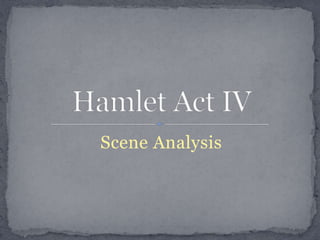
Act IV notes
- 2. Complete Journal question #4 - “unrequited love” -
- 3. You can see from the quickness with which the scenes of Act IV proceed that the action has reached a great point of tension following the death of Polonius.
- 4. Simply hushes up Polonius’ death, burying his longtime advisor without any pomp or circumstance. Keeps the nature of his death a mystery
- 5. The return of Laertes The madness of Ophelia
- 6. “How all occasions do inform against me” Act IV, Scene 4
- 7. The basic position of Hamlet is one of befuddlement that these soldiers can go off to their deaths over a patch of worthless ground; While he, who has every reason to rage and war and battle Claudius, is introspective and melancholy
- 8. He chokes off his action with excessive contemplation Laertes stands in stark contrast when he comes back to avenge his father’s murder
- 9. “Rightly to be great / Is not to stir without great argument, /but greatly to find quarrel in a straw / When honor’s at the stake” In other words, the greatness of man comes not with the greatness of an occasion, but with treating any occasion, however petty, as an occasion for greatness
- 10. One should not over think but DO. Of course, this is not Hamlet’s character at all As soon as he has resolved that his thoughts be bloody or nothing at all, he is off to England, leaving revenge for another day, if ever.
- 11. Hamlet seems to express the central irony in his case It is not enough that his thoughts be bloody --- they already are bloody What he needs, or what his father’s spirit needs, is bloody deeds, not thoughts, and those are, as ever, beyond our protagonist
- 12. Scene 5
- 13. Laertes, though, provides precisely the model of what Hamlet is not. Laertes’ vengeful return, like Fortinbras’ military example, serves as a contrast to Hamlet’s over thinking, hesitant character
- 14. Laertes is a true avenger When he bursts into court demanding satisfaction, he says, “That drop of blood that’s calm proclaims me bastard, / cries cuckold to my father …”
- 15. In other words, Laertes proclaims that he has a blood-bound duty to avenge his father’s death impetuously and bloodily, or else he proves himself not his father’s son.
- 16. In contrast, Hamlet has been calm, reflective, passive, playful, morbid, and impotent in his own long- delayed quest for revenge A quest which has led rather to an attempt to find motivation to revenge, to reflect on the nature of revenge, the nature of man, and the nature of Hamlet
- 17. Hamlet has thought and thought but has not acted Laertes, we will see, acts without thinking
- 18. Up to this point, we have seen Ophelia represented as chaste, innocent, and obedient With her madness, however, she suddenly has a deluge of lines and a rich, startling consciousness.
- 19. The songs she sings are quite sexual – especially the one that begins, “Tomorrow is Saint Valentine’s Day” (page 229).
- 20. This ballad documents the duplicity of a man who promises to marry a young maid in order to get her into bed, and then abandons her because she relented to him.
- 21. Lends the reader to believe Ophelia herself gave up her virginity to Hamlet
- 22. Ophelia is perhaps demonstrating the cultural pressures of a young woman of her time, forced into the impossible position of simultaneous chastity and sexualization
- 24. Did Ophelia die accidentally or did she commit suicide? Gertrude describes her as dying almost in slow motion “Her clothes spread wide,/and mermaid-like awhile bore her up”
- 25. Question is … if Ophelia had time to sing songs while dying, why didn’t Gertrude try to save her? Perhaps Gertrude’s narrative is an attempt to protect Ophelia
- 26. She knows that Ophelia is better off dead and tries to hide the fact of her suicide with her narrative As with so many aspects of this play, the truth is not forthcoming
- 27. Any account of things in this play – whether the testimony of the ghost, the murmurings of Laertes’ followers, or this eye-witness account of Gertrude’s – leads to different interpretations As Hamlet says in Act II, “There is nothing either good or bad, but thinking makes it so.”
- 28. If there is one lesson to take from Hamlet, it is this – that by our very nature we cannot ever know the truth, only interpretations of the truth.